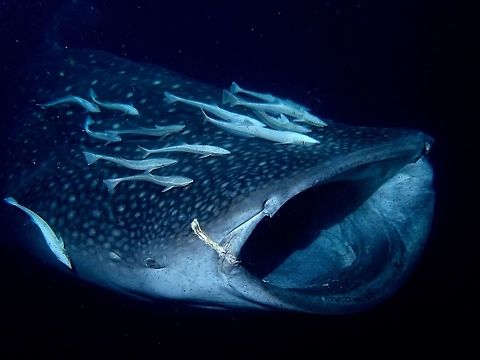Whale shark
Rhincodon typus
The whale shark, ''Rhincodon typus'', is a slow-moving filter feeding shark and the largest extant fish species. The largest confirmed individual had a length of 12.65 metres and a weight of more than 21.5 tonnes , and there are unconfirmed reports of considerably larger whale sharks. This distinctively-marked fish is the only member of its genus ''Rhincodon'' and its family, Rhincodontidae , which belongs to the subclass Elasmobranchii in the class Chondrichthyes. The species originated about 60 million years ago.
The whale shark is found in tropical and warm oceans and lives in the open sea with a lifespan of about 70 years. Although whale sharks have very large mouths, as filter feeders they feed mainly, though not exclusively, on plankton, which are microscopic plants and animals. However, the BBC program ''Planet Earth'' filmed a whale shark feeding on a school of small fish. The same documentary showed footage of a whale shark timing its arrival to coincide with the mass spawning of fish shoals and feeding on the resultant clouds of eggs and sperm.
The species was distinguished in April 1828 after the harpooning of a 4.6 metres specimen in Table Bay, South Africa. Andrew Smith, a military doctor associated with British troops stationed in Cape Town, described it the following year. The name "whale shark" comes from the fish's physiology, being as large as many whales and also a filter feeder like many whale species.
The whale shark is found in tropical and warm oceans and lives in the open sea with a lifespan of about 70 years. Although whale sharks have very large mouths, as filter feeders they feed mainly, though not exclusively, on plankton, which are microscopic plants and animals. However, the BBC program ''Planet Earth'' filmed a whale shark feeding on a school of small fish. The same documentary showed footage of a whale shark timing its arrival to coincide with the mass spawning of fish shoals and feeding on the resultant clouds of eggs and sperm.
The species was distinguished in April 1828 after the harpooning of a 4.6 metres specimen in Table Bay, South Africa. Andrew Smith, a military doctor associated with British troops stationed in Cape Town, described it the following year. The name "whale shark" comes from the fish's physiology, being as large as many whales and also a filter feeder like many whale species.
